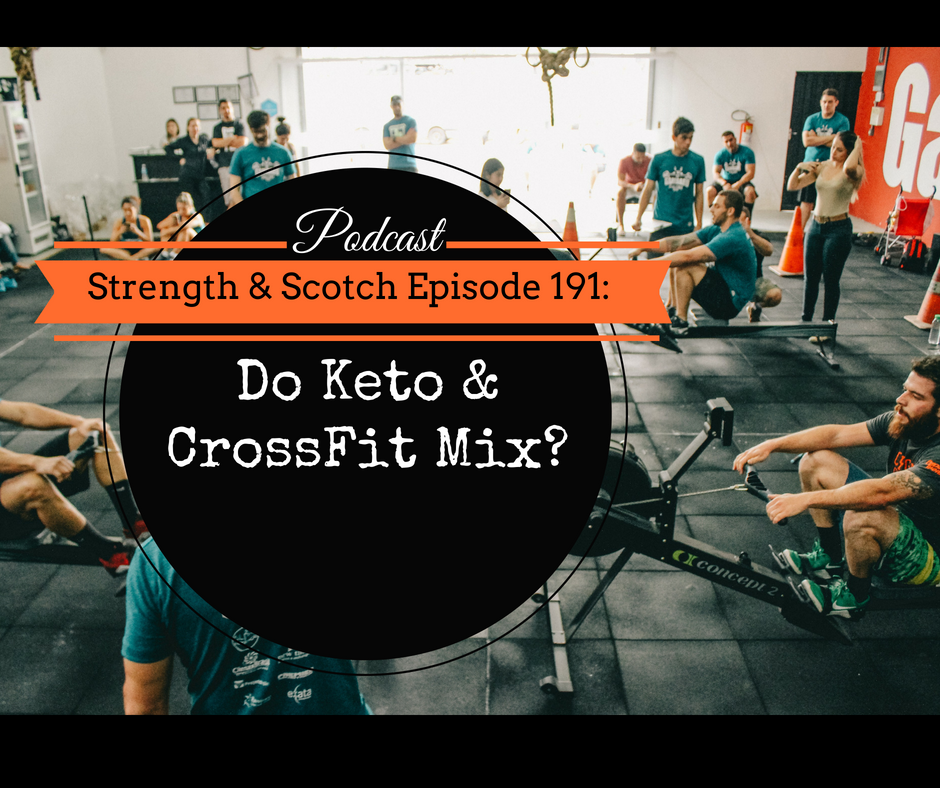SS 191 – Do Keto and CrossFit Mix?
Episode 191 Show Notes
Grant and Heavey cover the latest and popular, if not the most, popular fad diet currently out there today – the ketogenic diet. What’s this fuss all about? Is it really effective for weight loss? Should you consider doing it?
[01:25] Africa, Anyone?
Grant talks about his 3-week travel to East Africa. Get some first-hand tips and tricks from Grant to make sure you don’t get eaten by a lion! Seriously, if you want to go there, plan an 8-day Safari trip and spend the rest of the days exploring islands.
[06:05] Drink More, Live More
As always, Grant presents another article he found online about a study that says drinking alcohol is more important than exercise to living past 90. This is a large scale study conducted by the University of California starting back in 2003.
After analyzing more than 1,600 people who have lived past 90, they found that “modest drinking improves longevity.” The other indicators they looked into besides drinking were regular exercise and partaking in a hobby for two hours a day.
Another interesting factor they found for longer life is being overweight. They actually found that being overweight in their 70s lived longer than normal weight or underweight people. Heavey explains that when you become old and if you’re sick, you become frail. This could swing the numbers to say that overweight people might live longer since the underweight ones were already sick from a condition.
[11:15] Keto Diet: Getting In With the New
Heavey admits there’s so much crap about this diet today that it’s really hard to cover this topic in a meaningful way.
A ketogenic diet is a type of low carb, high fat diet characterized by an elevation of ketone bodies created in the liver as a result of low carbohydrate conditions.
These ketones serve as an alternate fuel source for your body. Normally, your body is preferentially using glucose (sugar) which is a form of carbohydrates for fuel. With the ketodiet, your body transitions over to burning ketones as a primary fuel source.
The diet is actually not new. In fact, it’s been around for a very long time and studied for the treatment of epilepsy. Heavey suggests the diet was discovered by serendipity. They found that patients with epilepsy who fasted experienced fewer seizures.
The thing is you can’t fast forever. You hear all these claims that keto can make you live longer or lose fat and perform better.
[15:10] What is the Keto Diet For Then?
Heavey came across a recent study done on a small number of recreational crossfitters. They were made to do a keto diet and the researchers measured the effects on a few performance markers as well as their body composition.
People recommend the keto diet for a lot of reasons, but whether or not those reasons are valid is another question. Too often, people draw connections from sources and come to conclusions that have not been rigorously tested.
However, there is emerging evidence that there are positive things that can come from this diet, including fat loss.
Now, back to the study. It was a 12-week study of crossfitters who were measured upon body composition, metabolic, and performance parameters. They had 12 participants with an average age of 31 and average body fat percentage at 23%. They made sure all participants were relatively strong and somewhat experienced in lifting, with a back squat to bodyweight ratio on average of 1.37. This means they can back squat over their body weight.
Out of the 12, 7 ran on the keto diet while the other 5 were under the controlled group. They measured baseline data and again 12 weeks later. They measured ketone levels throughout the study to make sure the group on a keto diet were compliant.
[18:50] The Effect of Keto Diet
Heavey points out that there’s a lot of speculation around the effect of keto on the glycolytic intensive activities like Crossfit and lifting that require sugar.
In the study, they saw a fat mass decrease of 12.4%, so they ended up losing about 2.5 kg of body fat over a 12-week period whereas the controlled group maintained their weight.
They also looked at the fasting glucose, HDL, triglycerides and the results were similar across the groups. The blood markers didn’t change that much. Performance-wise, they looked at power clean, 400-meter run, and VO2 max. Still, no changes in the performance for both groups.
[21:25] The Factor of Caloric Loss
A lot of times people will say that the reason you lose fat on a keto diet is because you’re burning fat for your fuel. Your body switched over to fat so you lose fat. What actually happens in a lot of studies is that when people switch to the keto diet, they end up spontaneously decreasing their caloric intake. Wisely, this was also measured in the study. The group that was doing the keto diet ended up reducing their calories by 550 calories per day on average throughout the study. This can definitely account for the 2.5 kg of fat loss.
As to why the calories were decreased, Heavey suspects that when people switch from a standard diet to a keto diet, even though it’s a high fat diet, oftentimes, they end up increasing their protein intake. Protein is a more satiating macronutrient, hence the decrease in hunger levels. This might be the cause of the shift in their average caloric intake.
There may be some role ketone bodies play in terms of appetite, but we’re not sure for now. Alternatively, when you switch to this diet, you are necessarily removing these high carb and high fat foods. For instance, you can’t eat potato chips. So the foods that are the worst for you, which is also the easiest to overeat on and don’t really give you any satiety are the highest in carb and fat intake. Those are the items that you end up having to eliminate.
[24:15] The Biggest Setback
Another point being raised here is that oftentimes, people have a hard time adhering to the diet. The biggest setback from any diet or the real reason you’re not getting any results from it is because you can’t stick to it.
Obviously, if you have trouble sticking to it, you’re not going to be able to spontaneously reduce your calories by 550 and see a 2.5 kg fat loss over a period of 12 weeks. Otherwise, you can lose fat while maintaining your performance if you’re able to maintain a keto diet.
[25:20] The Long Term Effect
Heavey points out the common theme of studies showing how beneficial weight loss is in a certain diet and compare it with a non-dieting control group. Then, they show how much weight was lost. However, this doesn’t tell us whether there is any superiority to it. It just tells us it’s possible.
Conversely, this study may suggest that the keto diet isn’t going to affect your performance for a recreational athlete. But if you’re a competitive Crossfitter, there may be a different set of circumstances as we don’t know the effect of this diet on Crossfitters over a longer period of time.
Crossfit is a very glycolytic activity so it’s possible that we could see some hormonal issues extending past a period of three months. Hopefully similar research on this is done to examine more long-term effects.
[26:55] Is Keto Diet Recommended?
Heavey is firm on not endorsing any diet. He thinks there is a time and place for almost all of them. He admits getting frustrated when people are “opportunists” when it comes to these kinds of diets.
Links:
Study: Drinking Alcohol More Important Than Exercise to Living Past 90

Check out the gear page for everything Strength & Scotch! You’ll find a listing of all the supplements and other programs we’ve discussed on the show as well as our killer t-shirts!

